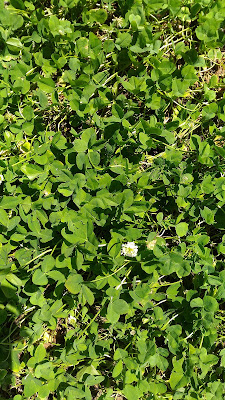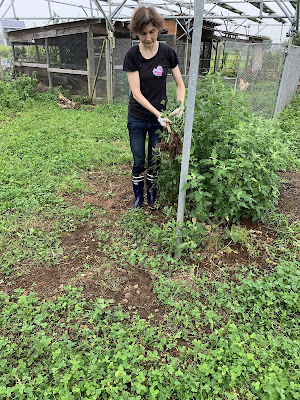While everyone else spends their summer weekends on the beach, in the mountains or at summer festivals, we do mostly weeding.
 |
| Worktime (front: Tobi-chan, back: Nobuo) |
 |
| Breaktime (left: Tobi-chan asking Nobuo for a cold drink; right: Haru-chan and Momo-chan) |
It's the fifth summer since we built the farm/power plant, and every single year the vegetation has been a pure, unchallenged life force swallowing everything and everyone who doesn't fight back. Without intervention, in a matter of few weeks the place becomes a jungle.
 |
| Jungle in the making |
Of the 1150 square meters of land, 1000 square meters are the goats' and chickens' run. We expected animals to take care of the greenery in their run, leaving only reasonable 150 square meters outside the run for human management.
Alas, men plan, goats and chickens laugh.
Now there are too few chickens to scratch the ground sufficiently to disrupt the plant growth, and goats get so many delicious treats from outside that they don't bother to eat what grows inside. This means that the entire 1150 square meters need human intervention to avoid junglification.
And we only have weekends for this.
 |
| Instead of weeding, Haru-chan and Momo-chan are fighting again. |
So we need a strategy.
Our current strategy consists of two approaches:
1. Outsourcing the help
This year we gave in and asked dedicated professionals from Tsukuba Silver Workforce Center (つくばシルバー人材センター) to help us with mowing and weeding. Japan is full of vital seniors eager to work. Their help has saved us a lot of time. It's a total win-win.
 |
| Silver Center Superman cutting grass in the back. |
2. Smart weed management
Just mindless mowing would be the silliest thing we could do. In order to reduce the workload in the future, we need a more strategic approach to ensure there is more of the good weeds and less of the bad ones. We realized that this is not something that happens naturally. If we left it to nature (and help it with indiscriminate mowing), the whole farm would soon be covered in yabugarashi (Cayratia japonica), which I consider the ultimate King of Japanese Weeds.
 |
| Yabugarashi (it looks innocent to untrained eye) |
Bad weeds
Why we don't need yabugarashi:
- Neither goats nor chickens eat it.
- Because it's a vine, it's hard to cut with a weed cutter (or scythe or sickle)
- It's almost impossible to "kill" because the roots are connected deep under the ground, creating immortal root web. It's actually quite impressive. But for us it means that unless we want to poison the entire place with aggressive weed killers, we'll have to deal with yabugarashi for the rest of our lives.
- It can't be composted (the "composted" stems will sprout again)
- There is no other use for it (at first we thought it had one use: it creates nice green curtain in the summer as it climbs up the fences, but the trouble with removing it afterwards was too much of a headache and we abandoned the green curtain idea)
There are a few more weeds that we want to have less of, for instance inutade (or akamanma, Persicaria longiseta) and shiroza (Chenopodium album), but these are at least good as goat food, so we want to keep them (in limited amount) in our weed portfolio.
Good weeds
Two major good weeds that we want to have more of are clover (Trifolium repens) and horsetail (sugina, Equisetum arvense) .
 |
| White clover carpet |
Clover is the friendliest wild plant I know. I even feel bad calling it weeds.
The reasons why clover is so lovable:
- It doesn't grow too big so it essentially does not need regular cutting.
- It's a favorite food of both chickens and goats.
- It's resilient (the roots can withstand chickens' scratching)(unless it's hundreds of chickens).
- It forms a soft, beautiful carpet that invites you to sit in and have a chat with a goat or a chicken while sipping cold beer.
- And wild bugs can still live in it.
Clover is the perfect weed.
But it's not the strongest of all. More aggressive weeds will take over if we don't step in. So what we do is hand-pick the other weeds and make more space for clover to spread around. Once it spreads, it will mostly stay there, hopefully with little intervention.
 |
| Removing other weeds (in this case shiroza) to make space for clover. |
Horsetail is for some reason hated by Japanese farmers, but it's absolute favorite of our chickens (therefore it doesn't survive long in their run), and even goats like it. Moreover, like clover, it doesn't grow too big nor is too agressive in any way. So we like it.
I'm thinking of doing my PhD in weedology. What other field would give you so much insight into the survival strategies of the species that humans work so hard to exterminate. There's a lot to learn from them. From the weeds, I mean.
